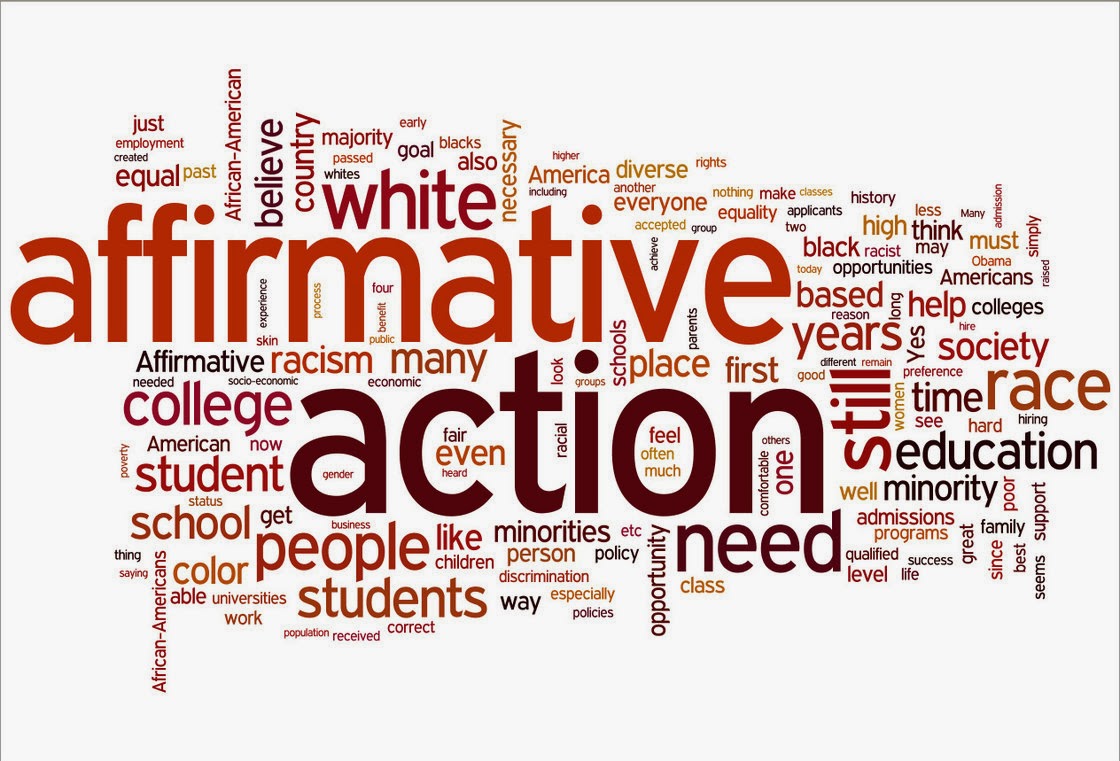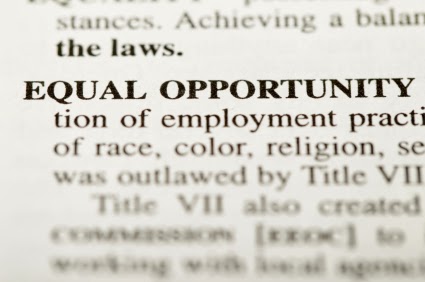Astronomy
However, they added, "Under Title VII, certain voluntary affirmative action plans are permissible for private employers. If a private employer can show that there is a conspicuous imbalance in traditionally segregated job categories, and, for example, qualified women in the applicable workforce are proportionally underrepresented in the job, then developing a plan to remedy that manifest imbalance may be legally above board."
- Aaswomen For March 14, 2014
AAS Committee on the Status of Women AAS Committee on the Status of Women Issue of March 14, 2014 eds: Michele M. Montgomery, Daryl Haggard, Nick Murphy, & Nicolle Zellner This week's issues: 1. Affirmative Action2. Response #1 to arguments against...
- On Reverse Discrimination
Ed Bertschinger recently wrote an about his recent encounter with a response to the charge of ?reverse discrimination.? It really struck a chord for me because I used to be ?that guy? who would point to reverse discrimination as part of my general (uninformed)...
- Reverse Discrimination?
This week I gave a talk about physics education that included a substantial discussion of the benefits of diversity in creating a successful university program. I was presenting in a different country, where the culture is patriarchal although respectful...
- Is Affirmative Action Still Worth Discussing?
The US Supreme Court will hear the case Fisher v. The University of Texas this fall in a case testing the limits of affirmative action in college admissions set by the previous case Grutter v. Bollinger. A young white woman, Abigail Fisher, was denied...
- Improving Faculty Searches
A faculty search is one of the most important processes overseen by a department chair. I've been involved with faculty searches, either as search committee member or chair, or as division head or department head, for 20 years. Over these years in...
Astronomy
Response #1 to arguments against affirmative action
 |
| Image credit: NPR vis Wordle |
Last year presented a hypothetical scenario in which a university incentivized an astronomy department to diversify their faculty. I wrote
A top-25 astronomy department has a major gender imbalance on their faculty. Let's say the fraction of women professors is below 10% of the overall faculty (This is a safe example since we don't actually know of such a department, do we? Right? Anyone?).
Let's suppose that the upper administrators at said hypothetical university (e.g. the Dean of Sciences) would like to address this problem with a radical approach. If the astronomy department conducts a programmatic search for a woman junior professor and identifies a candidate that meets the high bar expected of the university and department, then a special faculty line will be made available that won't count against future departmental hires.
I then solicited arguments against such an effort. I had several motivations in soliciting these arguments. First, I really want to get the lay of the land. I've heard scattered bits and pieces of arguments against affirmative action policies (e.g. "They're unfair to white men!" or "Women are getting jobs unfairly."), and I like to be prepared when discussing them. The comments I received motivated me to read up on the subject, and talk to more knowledgeable friends and experts. I also wanted to spark a community discussion on the topic, which based on the comments to my first post, on Facebook and in emails sent to me, I think I succeeded, at least amongst the people paying any sort of attention to the issue.
(Note that Joan Schmelz wrote an excellent, related piece on affirmative action yesterday).
(Note that Joan Schmelz wrote an excellent, related piece on affirmative action yesterday).
I made up this specific example because I didn't want to ask for arguments against the some unspecified definition or cartoon-model of "affirmative action." Affirmative action takes on many forms. Sometimes it acts to affirm that minority groups are welcome in science. Other times it corrects the ways in which we select for excellence. Other times it attempts to counteract implicit biases or institutional structures that prevent full participation, either explicitly or implicitly.
For this discussion I wanted to specifically address the issue of the "diversity hire," namely the programmatic consideration of someone who brings diversity to a department, either by virtue of who they are or through their actions, or both. However, I must now admit that the hypothetical that I came up with at the time was not precisely based on knowledge of how this sort of process actually takes place. Indeed, performing a faculty search aimed at a specific gender or ethnicity is prohibited by Title VII of the Civil Rights Act of 1964. As one commenter wrote:
This is a very bad idea. There are two ways this could go:
1) The department explicitly advertises something like "Seeking female astrophysicist". This is overt discrimination and is illegal under Title VII of the Civil Rights Act, among other things. (The university lawyers would forbid something this blatant if they are worth their salaries; if they didn't, it could lead to an expensive lawsuit.)
2) the department has either an explicit or a "gentlemen's agreement" (HA!) with the administration to advertise a job to the unwashed masses but to only hire a female, eg. "Seeking tenure-track astrophysicist...women and minorities especially encouraged to apply". This is still illegal if such an agreement exists.
I spoke to a lawyer about these concerns and they told me, "Generally speaking, [Title VII] prohibits discrimination in any employment decision on the basis of race, sex, color, religion, or national origin. This applies to hiring, discharge, compensation, and the terms and conditions of employment. The comment to your post discussing Title VII probably has it right: directly advertising a job for a female professor would violate this provision."
 |
| Image credit: www.workplacediscriminationlaw.com |
However, they added, "Under Title VII, certain voluntary affirmative action plans are permissible for private employers. If a private employer can show that there is a conspicuous imbalance in traditionally segregated job categories, and, for example, qualified women in the applicable workforce are proportionally underrepresented in the job, then developing a plan to remedy that manifest imbalance may be legally above board."
Thus, as with most things, it all comes down to execution. I am aware of several universities that are conducting searches specifically designed to increase the diversity of their faculty, and they are doing so within the bounds of the law, in consultation with lawyers who know far more about all of this than I do. Thus, let's set aside arguments against the legality of the details of my straw-person proposal, and instead focus on the merit of the intent: a university incentivizing a department to increase gender diversity.
Among the arguments that came up most frequently, here's one. I'll post others in future posts, but just as with this post, there may be a significant delay as I try to find my equilibrium in my new job.
[A]ffirmative action at least in the hiring of faculty puts the bulk of the cost on correcting historical imbalance on the people least responsible for it. Senior faculty who have arguably benefitted the most pay nearly no cost, while postdocs and other early career scientists pay a price. Given the rarity of faculty jobs, let us not pretend that there is no cost.
I certainly won't pretend that there is zero cost. There are cost-benefit considerations in any hire at any level of academia. Sometimes a department needs a radio astronomer, and this programatic consideration influences their final hiring decision. This may result in the dept. passing up a truly outstanding theorist in order to hire a radio observer. This is very unfair to theorists seeking faculty positions that year. It also means that the department didn't hire that really amazing theorist. That's a real cost. But the benefit may well outweigh that cost in the minds of the faculty in that particular department, particularly, e.g., if they invested heavily in CCAT. (BTW, it is worth mentioning that both of these candidates might be equally qualified for the job, yet the decision came down to a programmatic consideration. This happens in real life all the time, whether the programmatic consideration be observation vs. theory, or diversity vs. not).
 |
| http://www.inmotionmagazine.com/press.html |
As for shifting the burden onto the younger generation, this happens with all things in academia. At Berkeley I had to put up with overcrowded gym facilities because previous generations built a tiny gym. At Hawaii there were no undergraduate astronomy students with whom I could work as a postdoc because previous administrations at the University of Hawaii at Manoa decided that there wouldn't be an undergrad astronomy program (they are starting one now, I hear. Also, at the time they had an REU program.).
In astronomy, the older generation operated within a society that for much of history excluded women from academia. Period. As products of that generation, our forefathers built institutional structures and made decisions that benefitted them. Which is to say, they built a system that benefitted men. Not necessarily because they were actively or consciously chauvinistic (although some were/are). Instead, when groups of astronomers gathered to make decisions about the structure and future of the field, they attempted to maximize their benefit, where "their" refers to straight, white males.
These decisions carried costs for our forefathers. Astronomers hired in 1950 competed against only about 40% of the potential talent pool. Imagine selecting your nation's Olympic sprinter based on a 10-woman field in which six of the runners weren't at the starting line due to food poisoning the night before. I think the team would pay a price, especially if the best sprinter was unfortunate enough to order the wrong dinner the night before. The reasons for the reduced competitive field in astronomy aside, the result was a situation that was far from the meritocracy that we value in academia. This is a real cost. And I note, it's a cost very rarely mentioned by those who cry "reverse discrimination."
 |
| http://images.uptilo.com/blacklava/ |
Further, to pretend that those benefits are confined to history with no consequences for how we do business today is naive in the extreme. As a male astronomer, I am a direct beneficiary of many of the decisions made by past generations of male astronomers. I have enjoyed these benefits throughout my career. As the breadwinner in a single-income household for the past six years, I became a perfect fit for today's academy, and I have been rewarded as a result. As a beneficiary of the present system, I am unconscious of many of my privileges, as are most people, even those of the current generation. I've also found myself in many situations defending the status quo due to my ignorance of how it affects others (I am grateful for my network of friends and mentors who keep me in check). Those who have been handed down a system of male privilege are not likely to recognize it, nor are they going to jump at the opportunity to give up their inherited privileges.
Thus, it is not just the past generation that benefits from past decisions. Unless we take action today, these benefits will just continue to be passed along to the detriment of minority groups. Corrective action (affirmative action) carries a cost, to be sure. But there are also substantial benefits, particularly for those of us who wish to operate within a true meritocracy. Such a situation will not come about overnight. We need to recognize that A) we don't currently inhabit a meritocracy and B) we need to take action today to create a meritocracy in the future. Otherwise, kids born today will have this same discussion while we of today's generation will sit back enjoying the privileges handed down to us.
- Aaswomen For March 14, 2014
AAS Committee on the Status of Women AAS Committee on the Status of Women Issue of March 14, 2014 eds: Michele M. Montgomery, Daryl Haggard, Nick Murphy, & Nicolle Zellner This week's issues: 1. Affirmative Action2. Response #1 to arguments against...
- On Reverse Discrimination
Ed Bertschinger recently wrote an about his recent encounter with a response to the charge of ?reverse discrimination.? It really struck a chord for me because I used to be ?that guy? who would point to reverse discrimination as part of my general (uninformed)...
- Reverse Discrimination?
This week I gave a talk about physics education that included a substantial discussion of the benefits of diversity in creating a successful university program. I was presenting in a different country, where the culture is patriarchal although respectful...
- Is Affirmative Action Still Worth Discussing?
The US Supreme Court will hear the case Fisher v. The University of Texas this fall in a case testing the limits of affirmative action in college admissions set by the previous case Grutter v. Bollinger. A young white woman, Abigail Fisher, was denied...
- Improving Faculty Searches
A faculty search is one of the most important processes overseen by a department chair. I've been involved with faculty searches, either as search committee member or chair, or as division head or department head, for 20 years. Over these years in...
